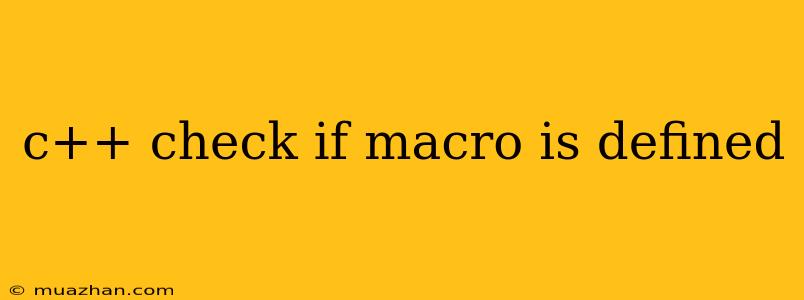C++: Checking If a Macro is Defined
In C++, macros are powerful tools for code abstraction and optimization. They allow you to define reusable code snippets that can be easily replaced during preprocessing. However, sometimes you might need to check if a macro is already defined before using it, especially when dealing with external libraries or conditional compilation.
Here's how you can check if a macro is defined in C++:
Using the #ifdef Preprocessor Directive
The most common and straightforward way to check if a macro is defined is using the #ifdef directive. This directive checks if a macro has been defined previously.
#ifdef MY_MACRO
// Code to be executed if MY_MACRO is defined
#else
// Code to be executed if MY_MACRO is not defined
#endif
Explanation:
#ifdef MY_MACRO: This line checks if the macroMY_MACROis defined. If it is defined, the code block following this line will be executed.#else: This line introduces an alternative code block that will be executed ifMY_MACROis not defined.#endif: This line marks the end of the#ifdefblock.
Example:
#include
#define DEBUG
int main() {
#ifdef DEBUG
std::cout << "Debug mode is enabled!" << std::endl;
#else
std::cout << "Debug mode is disabled!" << std::endl;
#endif
return 0;
}
In this example, the macro DEBUG is defined at the beginning of the code. When the code is compiled, the #ifdef directive checks for its presence and executes the code block inside the #ifdef block. If the macro is not defined, the code inside the #else block will be executed.
Other Preprocessor Directives
You can also use the following preprocessor directives to check for macro definitions:
#ifndef: Checks if a macro is not defined.#if defined(MY_MACRO): Checks if a macro is defined.#if !defined(MY_MACRO): Checks if a macro is not defined.
When to Use Macro Checks
Here are some common scenarios where checking for macro definitions can be helpful:
- Conditional compilation: You can use macros to conditionally include or exclude specific code blocks based on different compilation environments or build configurations.
- Preventing multiple definitions: If a macro is defined in multiple headers, checking for its existence before defining it can prevent redefinition errors.
- Feature flags: Macros can act as feature flags, allowing you to enable or disable certain features in your code during development or deployment.
By understanding how to check for macro definitions, you can write more robust and flexible C++ code that adapts to different environments and situations.
